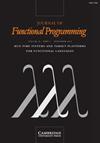Fault-tolerant functional reactive programming (extended version)
IF 1.1
3区 计算机科学
Q4 COMPUTER SCIENCE, SOFTWARE ENGINEERING
引用次数: 3
Abstract
Abstract Highly critical application domains, like medicine and aerospace, require the use of strict design, implementation, and validation techniques. Functional languages have been used in these domains to develop synchronous dataflow programming languages for reactive systems. Causal stream functions and functional reactive programming (FRP) capture the essence of those languages in a way that is both elegant and robust. To guarantee that critical systems can operate under high stress over long periods of time, these applications require clear specifications of possible faults and hazards, and how they are being handled. Modeling failure is straightforward in functional languages, and many functional reactive abstractions incorporate support for failure or termination. However, handling unknown types of faults, and incorporating fault tolerance into FRP, requires a different construction and remains an open problem. This work demonstrates how to extend an existing functional reactive framework with fault tolerance features. At value level, we tag faulty signals with reliability and probability information and use random testing to inject faults and validate system properties encoded in temporal logic. At type level, we tag components with the kinds of faults they may exhibit and use type-level programming to obtain compile-time guarantees of key aspects of fault tolerance. Our approach is powerful enough to be used in systems with realistic complexity, and flexible enough to be used to guide system analysis and design, validate system properties in the presence of faults, perform runtime monitoring, and study the effects of different fault tolerance mechanisms.容错功能反应式编程(扩展版)
摘要高度关键的应用领域,如医学和航空航天,需要使用严格的设计、实施和验证技术。函数式语言已经在这些领域中被用于开发用于反应系统的同步数据流编程语言。因果流函数和函数反应式编程(FRP)以一种优雅而稳健的方式抓住了这些语言的精髓。为了确保关键系统能够在高压力下长时间运行,这些应用程序需要明确说明可能的故障和危险,以及如何处理这些故障和危险。在函数式语言中,对失败进行建模是很简单的,许多函数式反应抽象都包含了对失败或终止的支持。然而,处理未知类型的故障,并将容错性纳入FRP,需要不同的结构,并且仍然是一个悬而未决的问题。这项工作演示了如何扩展具有容错功能的现有功能反应框架。在值级别,我们用可靠性和概率信息标记故障信号,并使用随机测试注入故障并验证时间逻辑中编码的系统属性。在类型级别,我们用它们可能表现出的故障类型来标记组件,并使用类型级别编程来获得容错关键方面的编译时间保证。我们的方法足够强大,可以用于具有现实复杂性的系统,也足够灵活,可以用于指导系统分析和设计,在出现故障时验证系统属性,执行运行时监控,以及研究不同容错机制的影响。
本文章由计算机程序翻译,如有差异,请以英文原文为准。
求助全文
约1分钟内获得全文
求助全文
来源期刊

Journal of Functional Programming
工程技术-计算机:软件工程
CiteScore
1.70
自引率
0.00%
发文量
9
审稿时长
>12 weeks
期刊介绍:
Journal of Functional Programming is the only journal devoted solely to the design, implementation, and application of functional programming languages, spanning the range from mathematical theory to industrial practice. Topics covered include functional languages and extensions, implementation techniques, reasoning and proof, program transformation and synthesis, type systems, type theory, language-based security, memory management, parallelism and applications. The journal is of interest to computer scientists, software engineers, programming language researchers and mathematicians interested in the logical foundations of programming.
 求助内容:
求助内容: 应助结果提醒方式:
应助结果提醒方式:


